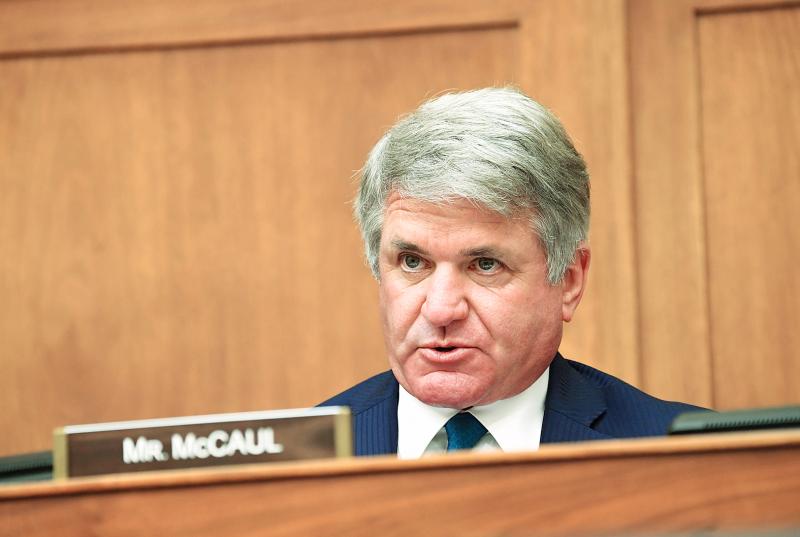The Ministry of Foreign Affairs yesterday thanked US lawmakers after a congressional task force published a report suggesting that the US government initiate trade negotiations with Taiwan and pass legislation to boost bilateral relations as soon as possible.
Taiwan would continue efforts to deepen ties with the US, the ministry said, after the US House of Representatives’ China Task Force on Wednesday published a report that highlighted threats that Beijing poses to the US.
“Taiwan is a bona fide democracy and a de facto sovereign nation, and US security ally,” the report said. “Taiwan is a critical focal point in the free world’s confrontation with the CCP [Chinese Communist Party], and under a more direct threat of CCP armed aggression than any other US partner.”

Photo: AFP
“The [US] administration should allow Taiwan to change the name of its diplomatic office to the ‘Taiwan Representative Office’ or a similar title,” it said. “Taiwan’s primary diplomatic organization inside the US is currently called the ‘Taipei Economic and Cultural Representative Office,’ an anachronistic title that does not reflect the fact that the US enjoys broad, substantial relations with all of Taiwan, not just its capital city.”
The US Congress should “support Taiwan’s acquisition of asymmetric capabilities for self-defense and the implementation of its Overall Defense Concept,” and continue to approve sales of arms to it as part of efforts to fulfill long-term US security commitments, it said.
“The CCP’s economic system is threatening US national security and foreign policy interests,” the report said, adding that China’s “unfair trade practices pose particular challenges because they systematically undermine fair competition and create damaging global overcapacity through grossly distorting subsidization, IP [intellectual property] theft, forced technology transfer, localization policies, and the use of state-owned enterprises to outcompete US companies.”
The administration should “deepen our trade ties with Taiwan and resolve specific outstanding trade issues so the administration can take steps to launch trade agreement negotiations once those issues are addressed,” it said.
The US Congress should pass the Taiwan Symbols of Sovereignty Act, the Taiwan Fellowship Act and the Taiwan Non-Discrimination Act, as well as ensure final passage of the Taiwan Assurance Act, it said.
Ministry spokeswoman Joanne Ou (歐江安) yesterday thanked the US lawmakers for their calls for the US government to take concrete action to deepen bilateral ties.
The ministry would communicate with US administrative agencies and US representatives to advance the friendship, Ou said.
The task force, established by 15 Republicans this year, is chaired by US Representative Michael McCaul.
The report also touched upon topics such as sanctions against Chinese telecommunications companies allegedly engaged in economic or industrial espionage in the US, evaluations of Beijing’s crackdown on Uighur Muslims in Xinjiang and whether the oppression constitutes genocide, and the origins of the COVID-19 pandemic, as well as Beijing’s failures to contain the novel coronavirus in its early stages.

The CIA has a message for Chinese government officials worried about their place in Chinese President Xi Jinping’s (習近平) government: Come work with us. The agency released two Mandarin-language videos on social media on Thursday inviting disgruntled officials to contact the CIA. The recruitment videos posted on YouTube and X racked up more than 5 million views combined in their first day. The outreach comes as CIA Director John Ratcliffe has vowed to boost the agency’s use of intelligence from human sources and its focus on China, which has recently targeted US officials with its own espionage operations. The videos are “aimed at

STEADFAST FRIEND: The bills encourage increased Taiwan-US engagement and address China’s distortion of UN Resolution 2758 to isolate Taiwan internationally The Presidential Office yesterday thanked the US House of Representatives for unanimously passing two Taiwan-related bills highlighting its solid support for Taiwan’s democracy and global participation, and for deepening bilateral relations. One of the bills, the Taiwan Assurance Implementation Act, requires the US Department of State to periodically review its guidelines for engagement with Taiwan, and report to the US Congress on the guidelines and plans to lift self-imposed limitations on US-Taiwan engagement. The other bill is the Taiwan International Solidarity Act, which clarifies that UN Resolution 2758 does not address the issue of the representation of Taiwan or its people in

US Indo-Pacific Commander Admiral Samuel Paparo on Friday expressed concern over the rate at which China is diversifying its military exercises, the Financial Times (FT) reported on Saturday. “The rates of change on the depth and breadth of their exercises is the one non-linear effect that I’ve seen in the last year that wakes me up at night or keeps me up at night,” Paparo was quoted by FT as saying while attending the annual Sedona Forum at the McCain Institute in Arizona. Paparo also expressed concern over the speed with which China was expanding its military. While the US

SHIFT: Taiwan’s better-than-expected first-quarter GDP and signs of weakness in the US have driven global capital back to emerging markets, the central bank head said The central bank yesterday blamed market speculation for the steep rise in the local currency, and urged exporters and financial institutions to stay calm and stop panic sell-offs to avoid hurting their own profitability. The nation’s top monetary policymaker said that it would step in, if necessary, to maintain order and stability in the foreign exchange market. The remarks came as the NT dollar yesterday closed up NT$0.919 to NT$30.145 against the US dollar in Taipei trading, after rising as high as NT$29.59 in intraday trading. The local currency has surged 5.85 percent against the greenback over the past two sessions, central